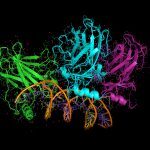Link to Pubmed [PMID] – 15901846
Mol. Pharmacol. 2005 Aug;68(2):467-76
The initial aim of this study was to identify protein changes associated with long-term morphine treatment in a recombinant human neuroblastoma SH-SY5Y clone (sc2) stably overexpressing the human mu-opioid (MOP) receptor. In MOP receptor-overexpressing sc2 cells, short-term morphine exposure was found to be much more potent and efficacious in inhibiting forskolin-elicited production of cAMP, and long-term morphine exposure was shown to induce a substantially higher degree of opiate dependence, as reflected by adenylate cyclase sensitization, than it did in wild-type neuroblastoma cells. Differential proteomic analysis of detergent-resistant membrane rafts isolated from untreated and chronically morphine-treated sc2 cells revealed long-term morphine exposure to have reliably induced a 30 to 40% decrease in the abundance of five proteins, subsequently identified by mass spectrometry as G protein subunits alphai(2), alphai(3), beta(1), and beta(2), and prohibitin. Quantitative Western blot analyses of whole-cell extracts showed that long-term morphine treatment-induced down-regulation of Gbeta but not of the other proteins is highly correlated (r(2) = 0.96) with sensitization of adenylate cyclase. Down-regulation of Gbeta and adenylate cyclase sensitization elicited by long-term morphine treatment were suppressed in the presence of carbobenzoxy-l-leucyl-l-leucyl-l-norvalinal (MG-115) or lactacystin. Thus, sustained activation of the MOP receptor by morphine in sc2 cells seems to promote proteasomal degradation of Gbeta to sensitize adenylate cyclase. Together, our data suggest that the long-term administration of opiates may elicit dependence by altering the neuronal balance of heterotrimeric G proteins and adenylate cyclases, with the ubiquitin-proteasome pathway playing a pivotal role.



